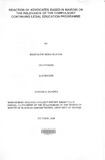| dc.description.abstract | Education is important for the imparting of knowledge, positive judgment as
well as developing wisdom. In a dynamic and competitive world, there is need
for individuals in all professions to ensure the systematic maintenance and
improvement of knowledge, skills and competence, and enhancement of
learning throughout their working life. Continuous Professional Development
therefore encompasses both formal and informal means of maintaining an
existing knowledge base by updating on changes; acquiring new knowledge
connected to the practice of a profession in order to extend and amplify
knowledge, sensitiveness or skill; and honing existing knowledge to improve
the overall standards of practice of a professional
The law Society of Kenya did in 2004 start a mandatory continuing education
programme for all advocates and further require that every application for
renewal of annual practicing certificate must by prove that the applicant has
secured five units of Continuing Legal Education in the previous year of
practice. This requirement effectively makes CLE mandatory since an
advocate can not practice without the certificate.
This study sought to establish the reaction of advocates practicing in Nairobi
to the mandatory CLE and also find out whether the advocates deem CLE to
be important to their legal practice. The study also sought to recommend
ways of improving the CLE programme.
From the findings of the study, majority of advocates practicing in Nairobi
agree that Continuing Legal Education is necessary and are indeed engaged
in Continuous Professional Development on their own. However, majority of
advocates are of the opinion that CLE should be voluntary rather than
mandatory and that it is not necessary to peg renewal of the practicing
certificate to the completion of CLE units.
The findings of the study also indicate that majority of the advocates are
moderately satisfied with the quality of the courses being offered as well as
the quality of trainers. However it appears that some more needs to be done
on this aspect to improve the quality of the programmes as well as that of the
trainers.
Advocates are agreed that that the number of units to be undertaken by
advocates should vary depending on the number of years an advocate has
been in practice and that some level of exemption is desirable especially for
advocates who have many years in practice. Of great concern is the fact that
majority of the advocates did not feel that attending CLE directly translates
into improvement of their legal practice. | en |

